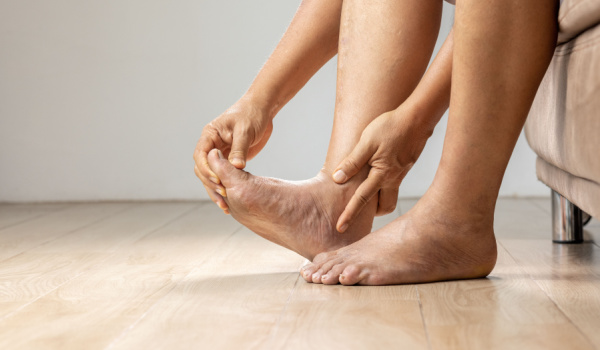Clinical study on the
Diabetic foot
Are you diabetic and suffer from a foot ulcer?
Then please get in touch with us.
We are looking for patients aged 18 and over for a clinical trial. More details on the selection criteria can be found below.
Register for study
Possible symptoms and consequences:
- Increased blood sugar
- Damage blood vessels
- Damage nerve tracts
- Open wounds
- Limited mobility
- Amputation
What we offer
We are looking for participants in our clinical trial who have these symptoms. We will help you gain a better understanding of your condition and possible treatment options.
You will receive extensive free study-related treatment from our specialists, as well as reimbursement for travel expenses.
Treatment and more
Important info
Treatment
The patients are randomly divided into three groups. Two thirds of the patients receive the investigational drug, one third receives an active substance or a placebo. Standard treatment for diabetic foot will continue to be followed for all patients, according to international guidelines, regardless of which treatment group you are assigned to. This means that you will not go untreated.
Time required
During the treatment phase, the investigational drug or placebo will be applied to the wound by your study doctor either once or twice a week for a maximum of 12 weeks or until your foot wound has completely healed. The wound is then covered with a bandage. Necessary dressing changes will be performed by a nurse or podiatrist at home or at the study center, as is best for you and the center. Study duration per patient:in: Maximum 15 months. Participants will be closely monitored during the study to effectively treat any side effects that may occur. The study will start with a two-week study period followed by a 12-week treatment period. Finally, patients are followed up for a maximum of one year.
Aim of the study
The study is being conducted to evaluate the safety, tolerability and efficacy of the investigational drug. By conducting the proposed clinical trial, we hope to find a new way to help patients with your disease - diabetic foot. In this clinical trial, the investigational drug is compared to a placebo. In addition, all patients receive standard therapy. The comparison with the placebo serves to better assess the effects and side effects of the test product.
The patients are randomly divided into three groups. Two thirds of the patients receive the investigational drug, one third receives an active substance or a placebo. Standard treatment for diabetic foot will continue to be followed for all patients, according to international guidelines, regardless of which treatment group you are assigned to. This means that you will not go untreated.
During the treatment phase, the investigational drug or placebo will be applied to the wound by your study doctor either once or twice a week for a maximum of 12 weeks or until your foot wound has completely healed. The wound is then covered with a bandage. Necessary dressing changes will be performed by a nurse or podiatrist at home or at the study center, as is best for you and the center. Study duration per patient:in: Maximum 15 months. Participants will be closely monitored during the study to effectively treat any side effects that may occur. The study will start with a two-week study period followed by a 12-week treatment period. Finally, patients are followed up for a maximum of one year.
The study is being conducted to evaluate the safety, tolerability and efficacy of the investigational drug. By conducting the proposed clinical trial, we hope to find a new way to help patients with your disease - diabetic foot. In this clinical trial, the investigational drug is compared to a placebo. In addition, all patients receive standard therapy. The comparison with the placebo serves to better assess the effects and side effects of the test product.
Clinical study: Diabetic foot
Participation criteria for study admission
These participation criteria must be met by the start of the study period:
- Age 18 or older
- Diagnosis of diabetes mellitus type 1 or 2
- At least one non-healing diabetic wound on the foot
Who cannot participate in this study? The following criteria will result in exclusion from the clinical trial:
- Current treatment in another clinical trial
- Hepatitis B/C Diagnosis
- HIV positive
- Diagnosis of myocardial infarction 1 month before start of study
- Planned major surgery during the study period
- Patients:inside with an active COVID-19 infection.
- The patient is pregnant or breastfeeding
In addition, there are other inclusion and exclusion criteria that the study physician will discuss with you.
Clinical study: Diabetic foot
How to participate in the study
The study will be conducted at the following sites. If you are interested in participating in a study and for further information, please contact us.
Thank you very much!
FAQ Clinical Studies
Frequently asked questions
A clinical trial is "any investigation involving human subjects", that tests new medical treatmentsdrugs or therapies to determine their safety and efficacy.
Clinical trials are crucial for the development and validation of new medical approaches, to enable advances in healthcare and improve existing treatments.
Clinical trials are conducted not only in hospitals, but also by physicians in private practice. Pharmaceutical companies are often the clients of such studies, but universities or hospitals can also initiate such studies. An educational interview will be conducted prior to potential participation. Here you will be informed about goals, methods, advantages and possible risks. After sufficient time to think about it, you can decide whether you want to participate in the clinical trial. Participation is always voluntary and can be terminated at any time without giving reasons. The initial consultation will be followed by the screening visit, during which your eligibility for the study will be assessed. If the assessment is positive, the baseline visit occurs, in which baseline values are recorded and then the study medication or a placebo is administered. During the treatment phase, regular visits are scheduled to monitor your health, the effectiveness of the medication, and any side effects. After the treatment phase, there is a follow-up phase to evaluate the long-term effects and safety of the medication.
Yes, the safety of the participants is a top priority. Clinical trials are carefully planned and monitored to minimize potential risks. Prior to participation, researchers must disclose all risks and potential benefits of a study, and participation is always on a voluntary basis.

